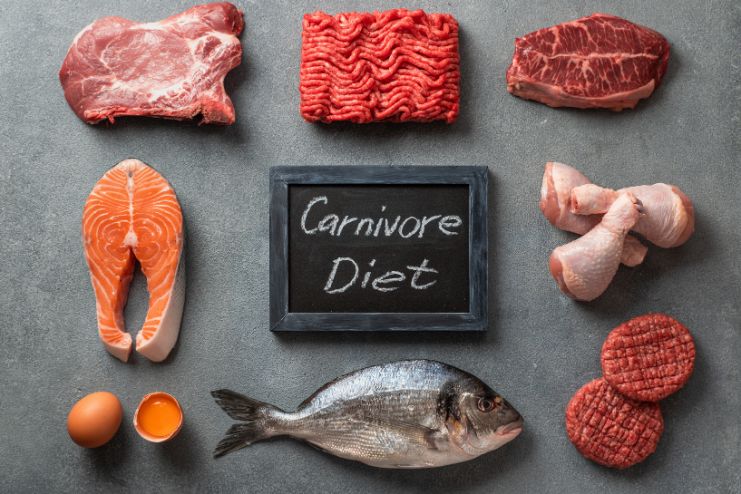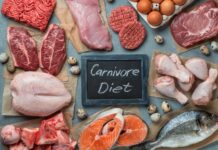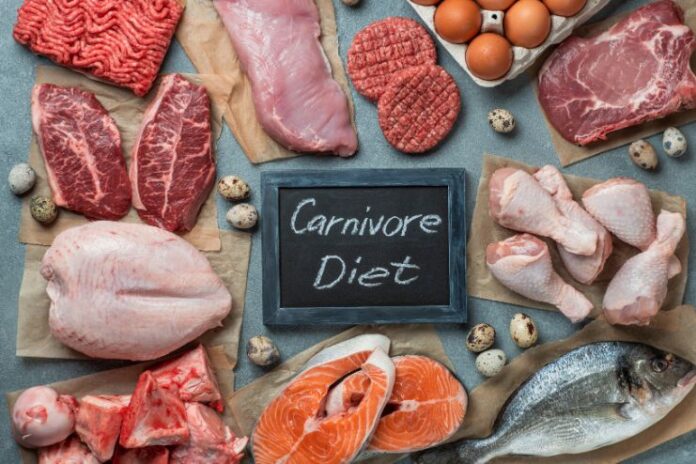The carnivore diet has drawn attention in the constantly changing world of dietary trends. This unusual eating pattern eliminates all plant-based meals and concentrates only on animal products, such as organ meats, fish, poultry, beef, and eggs. “Many people commend its straightforwardness and rigorous focus on nutrient-dense foods, crediting its development as a high-protein, low-carb strategy.
Social media sites like TikTok have seen an increase in the popularity of the all-meat or carnivore diet.
Supporters highlight amazing advantages, including quicker weight loss, better digestion, increased mental clarity, and decreased inflammation. With such lofty claims, many people wonder if the carnivore diet is a diet fad or beneficial. The carnivore diet is contentious since critics raise concerns about possible dangers and nutritional deficits.
According to medical professionals, the diet is unhealthy and could put those who already have certain illnesses, such as high cholesterol, at greater risk.
Read More: Navigating the Paleo Diet: Pros, Cons, and Practical Tips for Beginners
What Is the Carnivore Diet?
The carnivore diet only allows meat, fish, and animal products, including eggs and dairy products.
Other foods, such as fruits, vegetables, grains, legumes, nuts, and seeds, are not included.
Additionally, its supporters advise avoiding or consuming only foods low in lactose, a sugar present in milk and dairy products, like butter and hard cheeses. Proponents of the carnivore diet base it on the contentious theories that human ancestral cultures mainly ate meat and fish and that high-carb diets are responsible for today’s high incidence of chronic diseases.
Other well-known low-carb regimens, such as the paleo and ketogenic diets, restrict but do not eliminate carbohydrate consumption. However, the goal of the carnivorous diet is to consume no carbohydrates.
The American orthopedic physician Shawn Baker is the most well-known carnivorous diet advocate. He quotes testimonies from its adherents as evidence that the diet can help with depression, anxiety, arthritis, obesity, diabetes, and other conditions.
The Claimed Benefits: What Proponents Say

The carnivore diet is said to have several health advantages. Its proponents contend that by encouraging fullness and lowering total caloric consumption, the all-meat diet can help people lose weight.
It is also thought to help reduce inflammation, which may help with joint health, lessen the risk of chronic illness, and increase the body’s ability to recover from physical exercise.
According to proponents of the carnivore diet, eliminating plant-based foods may help people with autoimmune diseases by lowering their exposure to possible dietary triggers such as lectins and oxalates.
Furthermore, proponents assert that an entirely animal-based diet will improve metabolic function, stabilize blood sugar levels, and increase energy levels by avoiding carbohydrates and depending only on fat and protein for energy.
Few studies have examined the health effects of the carnivore diet and other mostly meat-based diets from a scientific standpoint, despite the fact that most of the data supporting its health advantages is anecdotal.
When Amber O’Hearn published an article in Current Opinion in Endocrinology, Diabetes, and Obesity in 2020, she claimed that the term “carnivore diet” was not even used in the title of a scientific paper.
Despite spending at least ten years researching the carnivore diet, planning a carnivore conference, and writing blog entries about it, O’Hearn acknowledges that there hasn’t been much scientific literature.
It wasn’t until she, an outsider without training in scientific research, took the initiative to get the topic mentioned in an article title.
Read More: The Sunlight Diet: Can Eating Seasonally Improve Your Health?
What Science Says

One of the primary problems with a carnivorous diet is the potential for deficiencies in essential micronutrients such as fiber, potassium, magnesium, and vitamin C.
Additionally, although animal-based diets are rich in vital nutrients, they are deficient in fiber, which is vital for gut health. According to a study examining the nutritional makeup of a carnivore diet, it is severely lacking in vitamins C and E and several minerals like calcium and magnesium. Still, it satisfies the daily vitamin B12, iron, and zinc requirements.
Long-term carnivore diet without supplements may result in inadequacies that impact bone, immunological, and cardiovascular health.
A wealth of evidence from nutrition and health studies shows that dietary fiber is essential for preserving the diversity of gut microbiota and encourages the synthesis of healthy short-chain fatty acids.
The expanding body of research over the past ten years, which links the gut microbiota to general physical and mental health, has also highlighted the significance of a balanced and healthy gut microbiome.
Numerous studies have connected lack of fiber in a carnivorous diet to dysbiosis of the gut microbiota, which may play a significant role in gastrointestinal issues like constipation, as well as diseases like diabetes, inflammatory conditions, and even cancer.
Who’s Trying It — and Why?
In addition to being frightening, the carnivore diet is exceptionally straightforward. It is a kind of extreme version of the ketogenic diet that has reportedly helped people lose weight and get rid of a number of health issues.
The carnivore diet draws many people with its potential health advantages. As they look for relief from chronic inflammation and digestive problems, those with autoimmune disorders, IBD (Inflammatory Bowel Disease), and arthritis are frequently among the first to test it. Removing plant-based irritants can lessen flare-ups and enhance symptoms in general.
Joe Rogan, the well-known podcast presenter and UFC analyst, is the recent celebrity to support the carnivore diet. He said in an Instagram post that following it through January helped him reduce his love handles, belly, and 12 pounds. “I have improvements in my vitiligo, and a lot of aches and pains went away,” he continued. I’m amazed. Rogan suffers from vitiligo, a skin condition that causes discoloration.
However, the diet gained widespread recognition at the beginning of the summer when well-known pseudo-intellectual Jordan Peterson promoted it on Joe Rogan’s podcast. Since 2017, Peterson and his daughter, lifestyle blogger Mikhaila, have adhered to an all-meat diet.
Read More: The Reverse Dieting Trend: Can Eating More Help You Maintain Weight Loss?
Potential Risks and Criticisms

While some ketogenic diets may prioritize consuming healthy mono- and polyunsaturated fats, carnivore diets do not. Saturated fat is the most unhealthy fat because it increases LDL (bad) cholesterol and makes up most animal fat.
All ketogenic diets have the drawback of raising LDL cholesterol levels over time and in the short term. Longer-term issues with the keto diets, particularly with the carnivore diet, include an elevated risk of osteoporosis, gout, and kidney stones. Additionally, renal impairment may result from the carnivore diet’s extremely high protein intake.
Eating a lot of red or processed meats and little fiber can raise your risk of developing colon cancer. Due to the lack of fiber in meat, you will experience constipation and many digestive issues. Your gut microbiota, which is crucial for immunity and digestion, may also be impacted.
Because the carnivore diet is so limited, you may also need to supplement your diet with specific vitamins and minerals. Vitamins A, C, and B12 are essential for good health, and they might be challenging to get each day without plant-based nutrition and other nutrient-dense foods.
Plant-based diet lowers the risk of heart disease, Type 2 diabetes, Alzheimer’s disease, and other chronic illnesses.
Read More: The 5:2 Diet Explained: Can Fasting Two Days a Week Help You Lose Weight?
Carnivore Diet vs. Balanced Diet: A Comparative View
Technically speaking, a carnivorous diet is not a ketogenic diet. The carnivore diet will have a higher protein content than a regular ketogenic diet. There won’t be many carbohydrates in it. It implies that practically every food consumed on a carnivorous diet will come from meat.
A carbohydrate-based diet will now be defined as having 25% fat, 35% carbs, and 40% protein. That is, for the most part, a balanced diet. Indeed, it is a very conventional diet that we can compare to the carnivore diet, though some people may find it a little higher in protein.
The carnivore diet, or low-carb, ketogenic diet, is intriguing in that its adherents eliminate carbs, a whole macronutrient. This immediately results in the body consuming fewer calories, which will immediately result in weight loss.
A sustainable diet encourages people to think about staying healthy for the rest of their lives. Yes, losing fifty pounds quickly feels fantastic, but what happens when you resume eating carbohydrates after a year or two? Does the weight return? Most likely. Try a different diet fad. Most likely. Resulting in some grave health issues? Probably.
On the other hand, we find that the carb diet, a well-balanced meal that provides 35% of our calories from carbohydrates, 40% from protein, and 25% from fats, is simpler to stick to.
Who Should NOT Try the Carnivore Diet?

Although there are supporters of the carnivorous diet, not everyone should follow it. People with lipid problems, gout, or kidney disease should avoid following this diet. Meat’s high purine content can exacerbate gout symptoms, and a high-protein diet can further tax already-compromised kidneys. The risk of heart disease may rise for those with cholesterol problems as their lipid profiles deteriorate.
Women who are pregnant or nursing should also avoid the carnivorous diet. Numerous nutrients, such as fiber, antioxidants, and a spectrum of vitamins and minerals present in plant foods, are essential for the growth of the unborn child and the health of the mother during these phases. Restricting the carnivore diet may result in dietary shortages that are harmful to both the mother and the child.
Children need a wider variety of nutrients for healthy development, which the carnivore diet might not offer.
The rigorous guidelines and severe food elimination may be upsetting to those who have a history of eating disorders.
Read More: The Potato Diet: Can Eating Only Potatoes Help You Lose Weight?
Tips for Those Considering the Carnivore Diet

If you’re considering trying the carnivore diet, you must approach it carefully to reduce hazards.
- To ease your body into the diet, gradually reduce your carbohydrate intake and increase the intake of animal-based meals.
- Meal planning can help you avoid making rash food decisions and ensure that you eat a variety of animal products.
- Stay hydrated all day, especially at the beginning of the diet.
- To guarantee a variety of nutrients, include various meat cuts, poultry, fish, and organ meats.
- Be mindful of your feelings and modify your dietary choices accordingly.
- Working with a nutritionist or functional medicine physician can help you balance your diet based on your unique needs and objectives for a safer and more individualized approach.
- Keep an eye out for warning indicators such as ongoing exhaustion, deteriorating digestive difficulties, or symptoms of vitamin shortages (hair loss, skin disorders, or muscle cramping). These could indicate that your body isn’t responding well to the carnivore diet and that you must change or stop eating altogether.
Read More: Understanding the DASH Diet: A Tool for Managing Hypertension
Conclusion
The carnivore diet might be beneficial in the short term, especially as an elimination plan for those with autoimmune diseases, digestive disorders, or inexplicable inflammation. Some individuals experience significant symptom improvement when they eliminate typical dietary triggers.
An all-meat diet’s long-term safety is unknown, though. The absence of fiber, phytonutrients, and a number of other essential vitamins and minerals legitimately raises concerns about gut health, dietary deficiencies, and the risk of chronic diseases.
Anyone thinking about adopting a carnivorous diet should proceed with very caution, ideally under the guidance of a physician and under individualized health monitoring. Routine nutritional assessments and gut health checks can reduce potential dangers.
References
- https://www.healthline.com/health-news/why-health-experts-have-beef-with-the-all-meat-carnivore-diet
- https://mcpress.mayoclinic.org/nutrition-fitness/a-meat-only-diet-is-not-the-answer-examining-the-carnivore-and-lion-diets/
- https://www.healthline.com/nutrition/carnivore-diet#what-it-is
- https://www.health.harvard.edu/nutrition/what-is-the-carnivore-diet
- https://stvincents.org/about-us/news-press/news-detail?articleId=61470
- https://www.news-medical.net/health/The-Carnivore-Diet-Healthy-Trend-or-Risky-Fad.aspx
- https://nutritionstudies.org/the-carnivore-diet-what-does-the-evidence-say/
- https://pmc.ncbi.nlm.nih.gov/articles/PMC11722875/
- https://www.news-medical.net/health/How-Does-Your-Diet-Affect-your-Gut-Microbiome.aspx
- https://www.news-medical.net/health/The-Carnivore-Diet-Healthy-Trend-or-Risky-Fad.aspx
- https://www.menshealth.com/nutrition/a24488031/carnivore-diet-results/
- https://hsph.harvard.edu/news/carnivore-diet-terrible-idea/
- https://yatesnutrition.com/carnivore-diet-review/
In this Article















